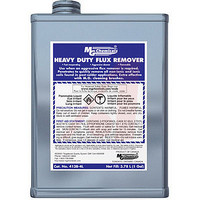413B-4L MG Chemicals, 413B-4L Datasheet - Page 3

413B-4L
Manufacturer Part Number
413B-4L
Description
Flux Remover; heavy duty; aggressive cleaning; 1 gal liquid
Manufacturer
MG Chemicals
Type
Flux Removerr
Datasheet
1.413B-4L.pdf
(7 pages)
Specifications of 413B-4L
Chemical Component
2-Propanol/2-Propanone/Ethyl Acetate
Primary Type
Cleaner
Special Features
Extra Strength
Weight
1 gal.
Product
Cleaners & Degreasers
Lead Free Status / Rohs Status
RoHS Compliant part
Hazardous Materials
Section 5: Fire Fighting Measures
Autoignition
Temperature:
Extinguishing
Media:
General
Information:
Section 6: Accidental Release Measures
Spill
Procedure:
Section 7: Handling and Storage
Handling: Wash thoroughly after handling. Avoid contact with eyes, skin, and clothing. Do not ingest or inhale. Do
Storage:
Section 8: Exposure Controls
Routes of
entry:
Ventilation:
Personal
Protection:
Section 9: Physical and Chemical Properties
Section 10: Stability and Reactivity
Section 11: Toxicological Information
Physical
State:
Boiling
Point:
Stability:
Conditions to
avoid:
Incompatibilities:
Polymerization:
Decomposition:
Sensitization: (effects of repeated exposure)
Carcinogenicity: (risk of cancer)
not expose container to heat or flame.
Keep away from sources of ignition. Store in a cool, dry, well-ventilated area, away from incompatible
substances.
Liquid
42°C
Remove all sources of ignition. Provide adequate ventilation. Wear appropriate personal protection.
Sprinkle absorbent compound onto spill, then sweep into a plastic or metal container. Wipe up further
residue with paper towel and place in container. Wash spill area with soap and water.
Eyes, ingestion, inhalation, and skin.
Use adequate general or local exhaust ventilation to keep airborne concentrations below exposure
limits.
Wear appropriate protective eyeglasses or chemical safety goggles. Wear appropriate protective
clothing to prevent skin contact. Use a NIOSH approved respirator when necessary.
450°C
Use water spray, dry chemical, carbon dioxide, or chemical foam.
Will burn if involved in a fire. Containers may explode in the heat of a fire. Vapors may form an
explosive mixture with air. Vapors can travel to source of ignition and flash back.
Stable at normal temperatures and pressures.
Temperatures over 40°C, ignition sources, and incompatible materials. Exposure to moist air
or water.
Alkali and alkaline earth metals, acids, acid chlorides, acid anhydrides, oxidizing agents,
reducing agents, powdered aluminum, zinc, magnesium, and beryllium. hydrogen peroxide,
potassium hydroxide, potassium t-butoxide, nitrogen tetroxide, and liquid nitrogen.
Will not occur.
Carbon monoxide, carbon dioxide, hydrogen chloride, phosgene, hydrofluoric acid, and
carbonyl fluoride.
Gravity:
Specific
Odor:
Ethereal
0.86
PAGE 2 / 4
Solubility:
Pressure:
Vapor
Flash Point: -18°C
Partial
1.02PSI
@21°C
Repeated skin contact may cause dermatitis.
No
Evaporation
Registered Quality System ISO 9001
Density:
MSDS Code: 413B - Liquid
Vapor
Rate:
Burlington, Ontario, Canada
QMI Certificate #004008
LEL / UEL: 2 / 13
6
(ether=1)
2.6
(Air=1)
pH:
N/a






